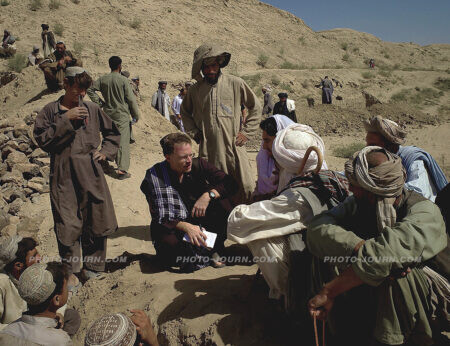Last week Pulitzer Prize winning and The New York Times (The Times) journalist, David Rohde escaped from seven months of Taliban captivity without the world ever knowing he was held hostage.
Rohde, along with local reporter Tahir Ludin and their driver, Asadullah Mangal, were abducted in Logar, outside Kabul, Afghanistan, on November 10, 2008, while he was researching a book about the history of America’s involvement there.
Last week Rohde and Ludin managed to escape their captors by climbing over the wall of a compound where they were being held in the North Waziristan region of Pakistan, 165km (100 miles) from where he was captured.
The two found a Pakistan Army scout, who led them to a nearby army base, and on Saturday they were flown to the American military base in Bagram, Afghanistan.
Media blackout

The strange thing about the episode is that up until the time of Rohde’s escape, no one knew anything about the kidnapping. Not a single media organisation reported Rohde’s abduction, out of concern for the men’s safety.
Bill Keller, the executive editor of The Times, said, from the early days of this ordeal, the prevailing view among David’s family, experts in kidnapping cases, officials of several government and others we consulted was that going public could increase the danger to David and the other hostages.
The kidnappers initially said as much. We decided to respect that advice, as we have in other kidnapping cases, and a number of other news organisations that learned of David’s plight have done the same. We are enormously grateful for their support.
What Keller never explained though was how The Times managed to get the likes of CNN, the BBC, Reuters, DPA, Al Jazeera and AFP to keep the matter quiet.
Both Keller and Rohde’s family declined to discuss details of the efforts to free the captives, except to say that no ransom money was paid and no Taliban or other prisoners were released.
Kidnapping, tragically, is a flourishing industry in much of the world, Mr. Keller said. As other victims have told us, discussing your strategy just offers guidance for future kidnappers.
Mainstream media nepotism on display
Indeed that might be the case, however, a quick check of The Times website shows no shortage of stories such as:
Gunmen Kidnap 3 Workers With Aid Group in Darfur; Gunmen kidnap French citizen in Kabul; Niger rebels claim kidnap of Canadian diplomat; Anti-kidnapping consultant kidnapped in Mexico.

So what made the conditions surrounding the kidnapping of Rohde any different to these others? What insightful information did The Times have that Rohde’s life was in any more danger than these other cases?
Of equal importance, why did other world media organisations choose not to report on the event? What pressure or persuasive powers did The Times have or exert on these other media outlets to ignore the story?
It’s ludicrous to believe even for a moment that august media outlets such as those mentioned previously, all of who have bureaux in Kabul, were not aware of the abduction.
The message would appear to be that stories that might endanger the life of other kidnap victims are good to go, but, when it’s a news media person the rules change.
One can’t help but think that The Times, along with these other media organisations, who so often sprout about a free and unhindered press; about the rights of the media to report the news without favour have set a very bad precedent with the Rohde kidnapping.
One can only now presume that when the next hapless NGO or foreign contractor in Darfur, Afghanistan, Somalia or the like is kidnapped, these same news organisations will not report the matter, out of concern for the hostages safety.
Anything else but would make the kidnapping of David Rohde and the subsequent silence by the world media appear as nothing else but nepotism or, even worse.
Feature photo Charles Krupa / AP file
He has spent extensive periods of time working in Africa and throughout Southeast Asia, with stints in the Middle East, the USA, and England.
He has covered major world events including Operation Desert Shield/ Storm, the 1991 pillage in Zaire, the 1994 Rwanda genocide, the 1999 East Timor independence unrest, the 2004 Asian tsunami, and the 2009, 2010, and 2014 Bangkok political protests.
In 1995 he was a Walkley Award finalist, the highest awards in Australian journalism, for his coverage of the 1995 Zaire (now Democratic Republic of Congo) Ebola outbreak.
Most recently he was the Thailand editor/ managing editor of AEC News Today . Prior to that he was the deputy editor and Thailand and Greater Mekong Sub-region editor for The Establishment Post, predecessor of Asean Today.
In the mid-80s and early 90s he owned JLF Promotions, the largest above and below the line marketing and PR firm servicing the high-technology industry in Australia. It was sold in 1995.
Opinions and views expressed on this site are those of the author’s only. Read more at About me
Latest posts by John Le Fevre (see all)
- Kaavan’s great escape photo special (video & gallery) – November 30, 2020
- A real life fairy tale: Cambodia provides sanctuary to Kaavan, the world’s loneliest elephant (video & gallery) *updated – November 30, 2020
- Death for corruption and press freedom abused as Thailand continues Nth Korean-like slide – July 23, 2015
- Thailand’s young rice farmers boost income, slash costs with switch to organic, AWD method – May 29, 2015


You must understand that we are not privy to certain details of this story. If all media conspired to keep silent, kudos to them if it mean’t protecting Rohdes safety.
Don’t judge as most of us are not experts on kidnapping, and I buy the fact that this case could have involved holding the NYTimes hostage, at some level.
They did EXACTLY THE RIGHT THING.
You are misspelling David Rohde’s name.
FWIW, the media has frequently withheld the details of kidnappings, not just this one. But it’s worth asking what are the specific criteria for doing so.
Thanks very much for the correction. I’ve amended those typos in the text and heading but not the URL.
It’s just very strange that not a single news organization published one story about it. Certainly glad he got out safe though and I’m sure there will be a great story coming out from him soon.